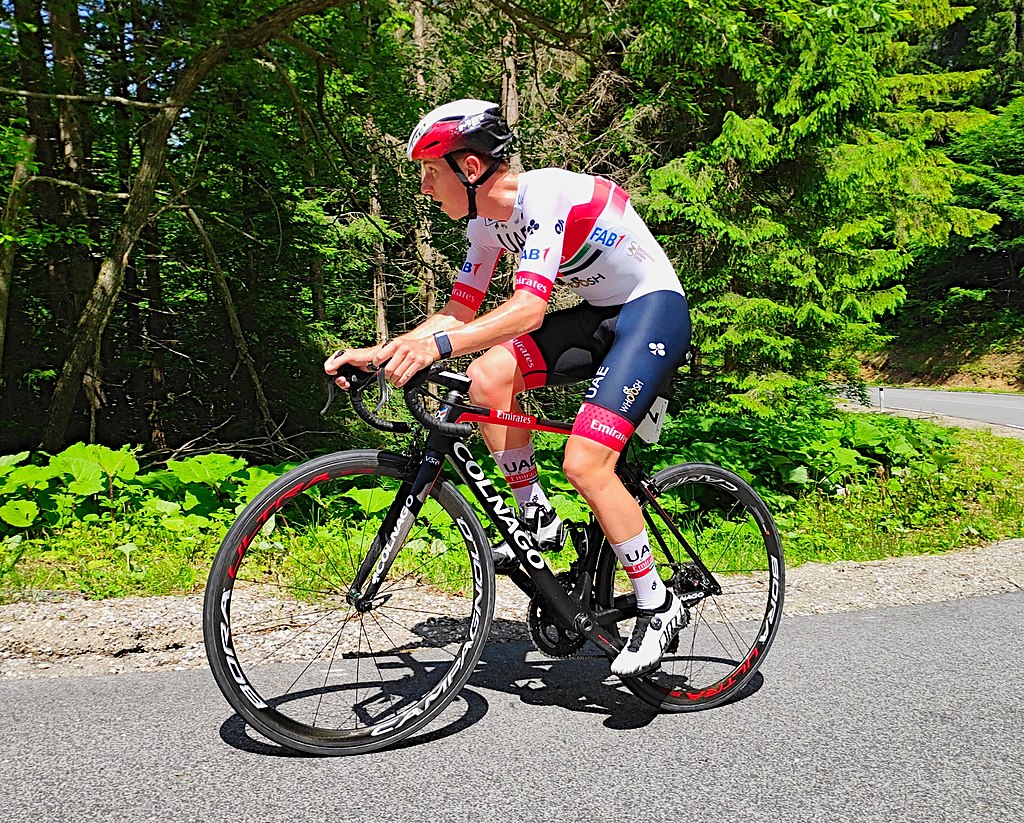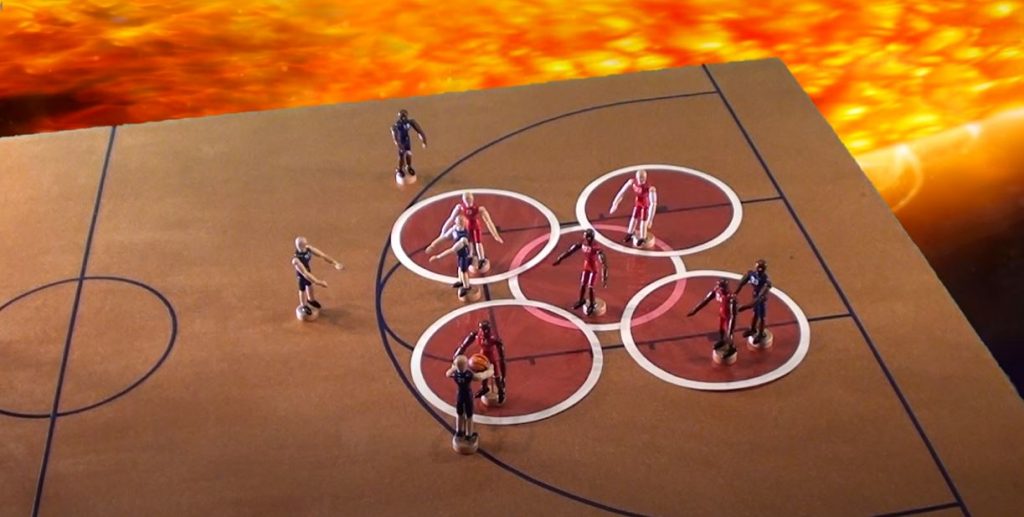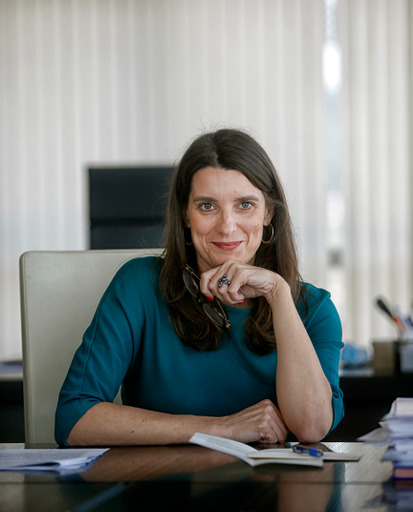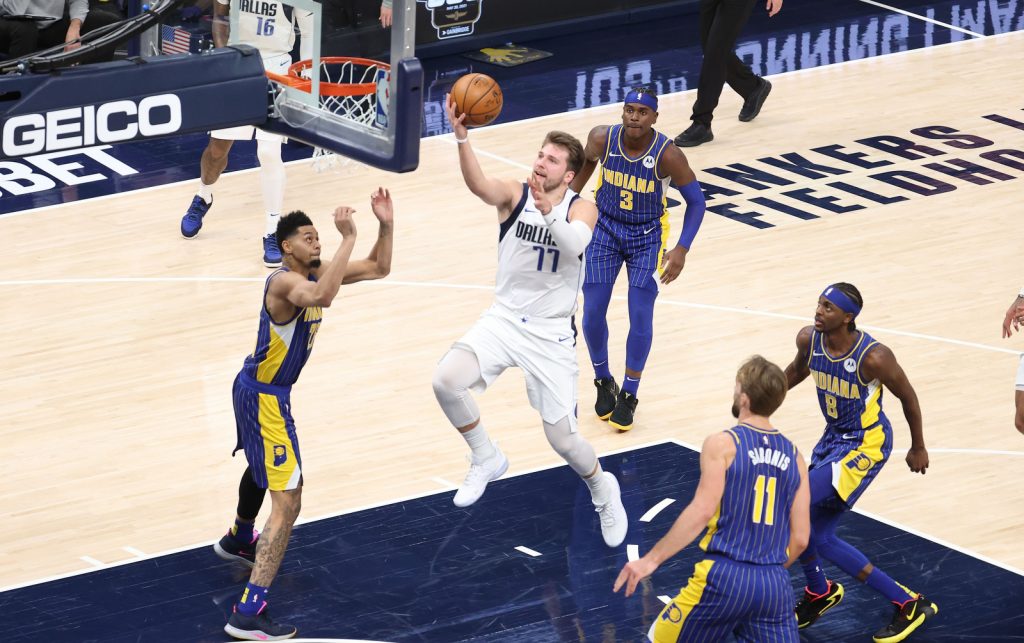Slovenia is only one game away from playing the basketball Olympic finals in the Tokyo Games where the Team USA is already waiting for an opponent. Can they make it? The Central European Affairs Magazine took a closer look at the country’s sports potential and spoke to Dr. Simona Kustec, Slovenia’s Minister of Education, Science and Sport.
Author: Jared Feldschreiber
Heading into the semifinals on Aug. 5 against France at the Tokyo Games, the undefeated Slovenia squad is one win away from the country’s first basketball Olympic medal. This is made even more impressive as the country is making its debut in Olympic basketball competition. Prior to gaining independence, Slovenian players represented Yugoslavia for many years before its first official game as an independent nation in June 1992. Slovenia’s prime sports in various Summer Olympics over the past three decades predominantly have routinely been in handball, cycling, volleyball, tennis, and boxing.
“Slovenia is a young country. In June, it celebrated 30 years of independence. Sports are surely one of the fields where Slovenia can show the results of its best talents,” says Nezka Figelj, a Slovenian native who served as a former political adviser at the European Parliament. “I believe Slovenia is mature enough to act independently in every field — from politics to economics, as well as in sports. I would prefer to see Slovenia depicted internationally as a European Member State, rather than as a Balkan nation,” she adds.
Figelj looks to the massive positive steps Slovenia has already taken “by becoming a Member of the European Union and joining NATO. Slovenia has also taken the presidency of the European Council on July 1 by taking charge with numerous challenges on the European level, such as with the pandemic and [confronting] economic difficulties. Slovenians culturally tend to avoid speaking about their merits, so it is very good to start doing that because they have many,” underscores Figelj. “[At the Tokyo Olympics thus far], Slovenia has won 4 medals. For a small country such as Slovenia, with only two million inhabitants, this is a great result,” continues Figelj. “While high expectations [have now been] put on the basketball team. Slovenia is also strong in cycling,” says Figelj who cites cyclist Tadej Pogačar – already a Bronze medal this year — as well as Primož Roglič, another cyclist, as some of the nation’s most prominent athletes.

Photo credit: Peter Milošević
Slovenia’s current basketball popularity and success at this year’s Olympics in Tokyo can be largely attributed to the stellar play of Luka Dončič. Slovenia has been undefeated in international play ever since Dončič donned the country’s jersey a few years ago. Slovenia won the EuroBasket Championship back in 2017, in part, propelled by Dončič who then was just 18 years old. Dončič also led his Madrid team to the EuroLeague championship a year later. Remarkably, Dončič had signed a five-year contract with that team in his early teens, and his consistently dominant international play led to him being selected to the EuroLeague All-Decade Team before his 20th birthday. He is already a two-time All-Star in the NBA at just 22 years of age with the Dallas Mavericks. He is set to make over $202 million USD over the next five years with the club, according to new reports.
Slovenia easily defeated Germany 94-70 at the Saitama Super Arena on Aug. 3 to set up Thursday’s semifinal against France. The team is the current #1 seed in Group C, and may meet the perennially dominant U.S. men’s national basketball team in the finals as the U.S. defeated Australia 97-78 in its semifinals match.
While Zoran Dragić had a standout game against Germany, scoring 27 points on 11 of 13, he graciously attributed the team’s success to Dončič. “[Dončič] is the team leader,” Dragić said after the game. “We know that and we accept that, but we have so [many] weapons on our team and it’s easy to play with him because when he plays, three guys have to guard him.”
The fandom for Luka Dončić transcends borders, and his impact as a player has already reverberated to all corners of the globe.
“[Even though Luka won a European Championship with the Slovenia men’s basketball team in 2017 and won countless personal awards, it still was not enough for him to be picked first in the NBA Draft,” says Ido Daniel, a project manager in Israel. “Luka came to the NBA as a mature player and he is doing what most Eastern European players are doing in the NBA — but better. Luka [improved] his shooting range in the last two years, and with his mature attitude and [by] his European way of looking at the game, he became a complete player.”
Daniel, a deeply knowledgeable and passionate fan of international basketball, saw the potential in Slovenia’s team even before Dončič’s arrival. While the U.S. men’s national team is the prohibitive favorite to win the tournament, the international style of basketball may bode well for a team like Slovenia. “The most common defense [approach] with European basketball is ‘Zone Defense,’ which rarely is used in the NBA,” explains Daniel. “In this type of defense — if you’re able to pass your defender — you most likely would need to face another defender on your way to the rim. It requires that you must think faster, and [takes] less athletic abilities. But the Americans do have better athletes.”
When asked whether he likes Slovenia’s chances to win the gold, “sports without underdogs are meaningless,” opines Daniel, giving credence to the notion that good fate may await the upstart Slovenians, though he made no guarantees.

Photo credit: Basics of Zone Defense, YouTube
Dr. Simona Kustec, Slovenia’s Minister of Education, Science and Sport, spoke EXCLUSIVELY to Central European Affairs Magazine to provide her assessment of her country’s overall success at this year’s Summer Olympics in Tokyo, particularly giving added emphasis to the success of men’s national basketball team. Dr. Kustec is also a political science professor and researcher at the University of Ljubljana.
CEA: What’s the current state of Slovenian sports in the Olympics and on the international stage?
Dr. Simona Kustec: We’ve [always] been a sports nation with great and successful athletes [whether it] may be in winter or summer sports. [Some of our best athletes include]: former skier Tina Maze, former cross-country skier Petra Majdič, [and other] skiers [like] Jure Košir, Mateja Svet, Bojan Križaj, and Miro Cerar, a gymnast from past decades. [Some] current athletes [include] ski-jumper Peter Prevc, Anže Kopitar who for National Hockey League, Luka Dončič, Primož Roglič, Tadej Pogačar, Tina Trstenjak, Janja Gambret, Franc Pinter, Franšek Gorazd Tiršek in Paralympic shooting, and many others.
We’ve come to the Tokyo Olympics and Paralympics with a smaller team than ever before, but [our] athletes [continue to possess great] potential to win medals. In Tokyo, our Olympic team, which includes the Paralympics’ athletes [total] 61. As of August 4, we’ve already won 4 medals: 2 gold, 1 silver and 1 bronze. But believe me, we have not had the last word just yet. We are currently ranked 19th in medals won among the 206 countries participating in the Olympics, and are ranked 6th by medals via GDP per capita. The Paralympics haven’t even started.

By far [we’ve achieved] outstanding [results], but in a historical sense, [the most exciting win could be for the men’s basketball team as it’s our first ever appearance [in this sport] at the Summer Olympics.
CEA: What do you make of Luka Dončič’s recent statement: “We’re making history for our country?”
SK: I [can vouch] for it with both of my hands! I believe that the team is making history for our country – for our basketball [program], [and for] our national spirit. The team has [provided us with] the strongest glue [for these] difficult times. It’s not just with winning, but also by giving us the best possible example of how a real team works: [with its] team spirit, fighting until the end, and unselfishly supporting [one] other. They are all showing respect by playing together toward a common goal. They are such great role models for everyone, especially for [our] young people. [The men’s basketball team has] shown that everything is possible if you work hard, cooperate and enjoy what you do.
CEA: What does this success mean for you, personally, as Slovenia’s Minister of Education, Science and Sport?
SK: It’s an honor to have these athletes at the Olympics and Paralympics this year, [mainly for] their attitude, appearance, and devotion. They pay great attention to the state, local communities, sponsors and to their supporters, which give them support. [This special] trust has been set since their childhoods, and the players haven’t forgotten their roots. We are all so proud [of them] for being Slovenes. Many left our small country to train and compete [at a] very young [age to] work really hard to get to [this] stage. I have great respect and admiration for all of them. Being a part of a small country, and having a team with these [type of] athletes, is just amazing.
CEA: How long has Slovenia had to play “second fiddle” to countries such as Serbia, Croatia, or even Bosnia, when it comes to prominence in sports?
SK: Never for winter sports! It is true that we dominated especially team sports in the former Yugoslavia by individual players such as Branko Oblak, Marko Elsner, Srečko Katanec in football, and Ivo Daneu, Peter Vilfan and Dušan Hauptman in basketball. We’ve always had good players. They had to battle to get a place on the national team, just like athletes from all over the world have had to do, but in bigger countries. In the end, it was proven that our sports DNA (and national identity) confirmed that the team was never fully complete [before being identifiably recognized as] Slovenian players.
CEA: When Slovenia’s men’s basketball head coach Aleksander Sekulić recently declared Luka Dončič is “obviously the best player in the world,” how much of this statement would you say was hyperbolic boasting?
SK: [It’s] not just [from] our coach, [but] also [from] other coaches and players of different countries and nations. [Various] sports media are saying the same thing. [Dončič] has the talent, and the potential to write a [new chapter] in this era of basketball. It is a pleasure to watch him — with how he plays, and with how much he enjoys playing.

Photo credit: Andy Lyons, Getty Images
CEA: What are some upcoming EuroLeague tournaments in Ljubljana or neighboring cities fans can look forward to after the Tokyo Olympics?
SK: Slovenia submitted [its] bid to host the Women EuroBasket in 2023. There is also an interest to host the Division 1 World Hockey Championships in 2022. Maribor — the second largest city in Slovenia – is also ready to host European Youth Summer Olympic Festival in 2023.
CEA: What are the next goals for the Slovenian men’s national basketball team whether they get a medal in Tokyo or not?
SK: First stop [for them will be] Ljubljana is to celebrate with the whole nation — and then onto [the] next tournaments. Regardless of the [outcome in Tokyo], the atmosphere in the country is going to be fired up! Goran Dragić — one of our best players in the NBA – recently invested in the construction of an outdoor basketball court in the heart of the main park of our capital city. This is now one of the most visited youth sports facilities in the city, [and it’s] available for [everyone]. And it’s free. I am more than [confident] that this is not going to be the last of this kind in Slovenia.
I have no worries. You will hear about Slovenia and its athletes in so many fields in the future.
Cover photo credit: FIBA

Jared Feldschreiber is a freelance reporter and contributor to Central European Affairs Magazine. He is based in Warsaw, Poland, and often chronicles literary figures, filmmakers, and dissidents in nascent democracies. Reckless Abandon, his novella, is available worldwide.
Twitter: @jmfeldschreiber
Photo credit: Ilan Sherman



